Or, a Testament From a Tree Fallen When No One Was There (It Does, in Fact, Make a Sound)
It has been a while since I have written anything more than a shitty cover letter for a job that I do not want, extended comments on my students’ oversights, or a brief social media post (aside from my insightful book review on Portfolio Society, forthcoming in Lateral). But, I think, now that the fog has cleared a bit, a recent event in my life and my theoretical analysis of it deserves some attention.
Important to note here my return to Lacanian psychoanalytic theory as I try to comprehend what I see as the callous inattentiveness of my “friends” and colleagues—shortly after I began my studies at George Mason University I was informed that, despite an application package that obviously identified my theoretical allegiance to psychoanalysis, this framework was not welcomed or appreciated, and that if I was not willing to divert, I should seek a better suited doctoral program. My discontent in shifting away from psychoanalysis was slowly quelled by (neo-?)Marxist theory, which was sufficient for explicating American consumer culture, as presented in my dissertation, though I personally believe Lacanian theory would have aided the argument in profound ways, which was only evidenced by my committee’s claim that I am “a much stronger theoretician” than my dissertation suggests. Regardless of my irritation (for lack of a better word) with the simultaneous attention to and dismissal of my scholarly potential, I return to the narrative at hand…
On Thursday, December 8th, the day after my final class of the semester at UMBC, I was hit by a pickup truck while riding my bicycle to workout at VIDA before my shift at Aura Spa. I remember very little of that morning, let alone the accident itself. What I do remember is yelling before the driver merged into my bicycle, the impact, waking up briefly in an ambulance, and, finally, waking up in a hospital bed with about ten medical students standing in a semi-circle at the end as someone asked if it was ok to cut my shirt off. The impact cracked my head open, a CT scan was performed prior to it being stitched and stapled back together.
Pic sent to my boss at 8:45am with the message: “I got hit by a car this morning. I don’t know if I’ll make it to work. I had to get my head stapled together.” Followed by: “Yeah. Can’t come to work. Covered in blood and in pain” at 9:18am.
No, I was not wearing a helmet. I didn’t even own a helmet. After my head was closed up and most of the blood was cleaned off my face, the officer who had been staring at me through the window in my hospital room came in to take my statement. Unfortunately, the driver of the pickup truck had driven away after colliding with my bike, a witness was only able to obtain a partial plate (temporary tags to boot), and the DC police have yet to find him (and I know it was a him because in my fog I still remember him looking at me as he drove into my bike and a witness statement identifies a male driver who looked back, recognizing he hit me before driving off).
Images above posted to social media: 1) 12/8/16, posted to Facebook and Instagram: “Hey there, bruised and bloodied, what happened to you? Nothing but a little morning hit-and-run when riding my bike to gym/work. D.C. Metro drivers are the worst but at least two kindly citizens worked to find the culprit and help me till I was safely retrieved by an ambulance”; 2) 12/9/16, posted to Instagram: “#phdlife introducing the “Ice Pack Hat” #staypositive #becareful”; 3) 12/10/16, posted to Facebook and Instagram: “That time I cracked my head open #nofiter #luckytobealive #hitandrun#bicyclesafety #wearahelmet”; 4) 12/13/16, posted to Instagram and Facebook: “#fashionista bruise-scarf coordination. #hotmess #hitandrun #wearahelmetkids”
I posted images of the various wounds, tracking the bruising and healing over the following days on both Instagram and Facebook. At the same time, my status updates to and engagement with social media became less frequent. I was—and am—really struggling with the accident and, moreover, my life as it stands.
You know how people say, “My life flashed before my eyes”?
Well, that’s not what happened really. It was more that as the accident settled in, as I realized how lucky I was to be alive, that I started to think, “Dear god… This is what I have done with my life… This is the mess created.”
Recently, as many know, my almost four year relationship ended. One of the reasons cited by my now-ex was that my unhappiness was causing him to be unhappy and while I believe this reason to be one of the most bullshitty of his shitty reasons for our long-failing relationship, being hit by a truck and almost dying (or blacking out, which is the closest thing I have experienced to death) the day after my last class of the semester made me think, “I am fucking miserable,” which, with the help of my GP-recommended therapist after the accident, I have downgraded to “not nearly as happy as I want/deserve to be.”
So, this is where I stand today. Trying to figure out what it is that will make me happy.
Posted to Instagram 12/16/16: “No-more-stitches-upside-down-gym-selfie!!!”
A big part of this is thinking about what has made me happy and successful in the past—what are the goals have I accomplished and skills have I honed that I can use in a meaningful way and makes me feel like I am contributing to the world around me? (Because this is important to me; this does not have to be everyone’s goal.) So, accomplishments: I have a PhD; that’s a big thing. I’m not so sure what it’s worth and therein are a lot of my struggles since I spent so much time and money on it. In completing a PhD I also developed a number of academic skills: research, writing, speaking, teaching, etc. But in devoting time to my education, I also devoted myself to a small community; specifically during the years I was completing the coursework required for my degree—those in my PhD became my friends.
I finished my PhD last December. That same month I had my surgery. In between then and the accident this December, I failed to get a book deal that seemed to be a sure thing, applied to over 100 jobs (getting very few interviews and zero offers for full time positions), and ended a relationship with a person who I really thought was “the one” (for better or worse), while watching many from my program, including graduates from the 2015-16 academic year, put out books, get visiting and tenure track positions as well as lucrative positions outside of academia, and get married and have children. I’m still here in DC; almost everyone else has found a calling elsewhere. Those who are left in the DC-metro are seemingly busy “adulting.” I’m complacently working in the service industry and getting hit by cars. What the fuck is my problem?
And then it dawned on me. I am my own problem. Or at least I have created my problem by constantly comparing myself—my successes and failures—to those holding the same academic degree when, as it has become evermore apparent, I have radically different ambitions and a different worldview. I have torn myself between who I want to be and who I wanted to be and by doing so I have allowed the fact that not one single person in my PhD program has reached out to check if I was ok winnow my self-esteem and ability to conceive of a life outside of the university setting.
The reason why I care what everyone else is doing and no one seems to care what I am doing is defined by my own subject position. I, in fact, have no idea if there are people who care about me. All I know is that no one has expressed any actual concern (aside from a couple passive “ouch” comments on social media) to indicate that they do. The notion that people should actively display care/concern is based on my own upbringing and experiences as to how to affectively engage with others, which is not necessarily the same for all people, no doubt. And yet, there is a level of commonality in the manner by which concern is expected to be expressed socially—specifically in casual, if not insincere, niceties like, “Sorry to hear about this” and “are you feeling better?” These expressions of (pseudo-?)concern can seem forced or irrelevant, especially to the analytical humanities academic mind, but the importance of these simplistic sentiments undergirds our social fabric. It makes for a community by facilitating a network of mutual safety and security. It makes people feel like they matter and that they belong. And, thereby, the omission of these sentiments is indicative of irrelevance and exclusion (non-belonging or excommunication).
I know these people—these former colleagues and friends—know how to perform social graces that don’t actually reflect their personal inclinations, feelings, or allegiances. For example, many of my colleagues who loathe babies, express frustration with children acting out in public, and extol the merits of voluntary human extinction will “like” others’ family picture on Facebook. A simplistic optimistic analysis of this action is that these individuals “like” the happiness their virtual friends have found in familial life; a simplified pessimistic analysis is herd mentality, by which the social media user is “liking” the image just because so many others have already done so. However, regardless of which of these two analytical stances one takes, both show a commitment to community. On one hand, care for the happiness of others, and, on the other, adherence to social norms (despite ideological differences in both cases). What these expressions show is a belonging of the individual within the community; a show that their continued presence is of value because, in someway, that individual serves in the reproduction of that community.
But, if there are ideological divergences within the community, what is the core commonality upon which the community is founded and maintained? Is that not too ideological?
I would argue the central node of community is a dominant binding ideological allegiance, which permits minor deviations to facilitate the appearance of individuality, while ensuring that the insularity of the community through its distinction from other, similar but dissimilar, communities.
Yeah, Allison, get your head out of your academic ass and just say what you mean…
The community from which I felt to have belonged and feel excluded from at present, I would define as a community of humanities academics holding a specific (far?) left socio-economic-political worldview defined by contempt for material and ideological institutions that compartmentalize groups and individuals in society, creating a complex hierarchy of privilege and penalty (i.e., republican/conservative politics, neoliberal economics), as well as a strong commitment to the value of the scholarly interrogation these socio-political institutions (because, let’s face it, no one in the humanities actually understands actual economics, sorry) and a, perhaps paradoxical, refusal to engage in blue-collar labor (i.e., work in the service industry) even when unable to obtain an academic or professional job.
If it is the case that the community is held together by this socio-political worldview, the choice (and there must always be choices in order for individuals to feel autonomous and uniquely valuable) to get married, have children, adopt a dog, or get one’s nose pierced, for instance, is irrelevant as long as the dominant ideology—that the social institutions that perpetuate hierarchy are wrong—is prescribed to in an obvious way—that one makes the appropriate socially relevant posts to social media, continues along an academically-oriented career path, and does not deviate into manual labor, even for the sake of financial stability. And it is the obviousness of this prescription that I wish to underscore here because this is where I failed and, as such, where I see the root of my exclusion as evidenced by the dismissal of my injury as cause for concern. While some of my colleagues will argue that they too have deviated from this ideology, a single infringement, such as employment as a part time bartender, especially when this combined with social media posts to indicate their unfair treatment based on assumptions about the aptitude of service workers, is not tantamount to indicating an ideological rupture.
I am the unfortunate evidence of the constructed, referential, and oppositional nature of identity and ideology. More than an simply serving as evidence that some people have to work, exerting energy in a manner that detracts from their ability to pursue something more “meaningful” that may contribute to a “better” society by reproducing the status quo (that there is a working class, that ours is a capitalist consumer economy, that we must pay to meet our needs). But, more problematically, in my retraction from academia and armchair politics, I have seemingly given myself to the notion that mindless distractions and menial labor is acceptable. And while this may be the dominant mode of existence in contemporary society, I have spent years studying the systems of oppression that structure our society. I have seemingly become complacent while knowing better.
In my knowledge of and, therefore, decision to accept what is offered instead of the change I wish to see in the world (bitches love Gandhi), I serve as an uncomfortable reminder of the persistence of dominant ideology and social structures, as well as the necessarily oppositional referent that it serves in contrast to leftist ideology—not just that leftist ideology is founded on the fact there is something on the right side, but more importantly that the right side continues to exist for without it there would be no left community. This is to say, there would be no academics if everyone had, or had access to, the same knowledge and ideological worldview.
And in appearing to move from one ideological camp to another—whether by choice or simply evolution—I serve to draw attention to the constructed nature of identity based on social structures embedded in inequitable, hierarchical ideologies that are as important to those “in power” as they are to those who purport to actively oppose or resist them. Unable to wholly position myself neither here nor there, I have become the human embodiment of the meaninglessness of meaning.
I find myself—my actions and my virtual presence—calling attention to the gap, as posited by Lacan or what Freud theorized as the navel—the “ultimately unknown centre”—around which subjective experience and the system of signification it requires is manifest. As the signifying system that allows us to understand, to communicate, to define ourselves and who we are requires difference and contrast, the existence of an impenetrable gap ensures the impossibility of completion because it is inside that gap we are complete. But, while the gap must persist, it must be rendered invisible, thereby allowing the appearance of difference as natural. If difference is natural, it is the way difference is handled that becomes questionable and amendable. Social justice, equity, democracy, and whatever else we want to associate with fairness amongst humanity are not based on the fact we are all the same, but instead that we are all uniquely different and, it is in that difference, that our voices matter.
It is the understanding of fundamental difference upon which community is formed and maintained—that different types of people stick together and reproduce different group practices, beliefs, values, and lifestyles (regardless of the fact that there is an omnipresent dominant ideology of social order and political-economic participation, success, and recognition that underwrites all community ideologies). Pierre Bourdieu best describes the notion of fundamental difference as both socially manifest and ultimately inescapable in his theorization of class-based habitus. In living habitus, one can interact with different social groups and even feign belonging, but in time will reveal his or her true position within the social order. I, being a PhD holder with a working class background, hold a marginal position, but there are other PhDs from working class backgrounds who are likely to get hit by trucks and receive utmost compassion.
The academic community then is not purely founded on middle class habitus, but its fundamental differentiation is in intellectual faculties, which cannot be completely tied to economic status. These intellectual faculties include the ability to recognize that the system underlying the whole of our society is unequal and therefore unfair. That we are different, but what is important is the valuation (if not celebration) of difference, not its undoing.
Simply put—in the quest for social justice, those who are smart are allowed to assert they are smarter than others. They are allowed to be friends with “intellectual equals” and dismiss others as Other, while maintaining this is not at all what they are doing because they value equality.
By having the wrong friends—or too many of the wrong friends or by enjoying my time with those friends more than the time I spent with those in academia (which is completely true, sorry jerks)—my existence problematizes the fundamentality of difference. My inability to perform according to the codes of my community—a community that I had worked to gain entry to and not one I was born into—serves as an indication of the real failure of that community as more than a symbolic construction based on an ideology of difference which requires the maintenance of the hierarchy it purports to abhor.
Evidence there are people who care (and that those people came to see me while I was at work, at the spa). Images posted to Instagram, 12/18/16: 1) “Sometimes someone will try to make you feel better. And it will work. But you will also end up crying…”; 2) “And then I got flowers”
I am demonstrative of the lack of realness of humanity.
But in serving as the reminder of symbolic interaction as all interaction, my real actions—and with them my physical body—become muddled within the web of meaning that I have seemingly befuddled not in my choice to be both a spa coordinator and a college professor, but to prefer being a spa coordinator to being a college professor.
The fact that someone—anyone—knowledgeable/educated could make this choice appears as ironic, sarcastic, or hyperbolic—a commentary on the sad state of academic and the lack of monetary and professional respect afforded to academics. It fades into the unrealness of social media as acting, instead of calling to the unrealness of the social world itself and the imagined communities that support the continuation of difference as something really important and socially meaningful.
So, what does getting hit by a truck have to do with any of this?
Getting hit by a truck has nothing to do with anything because I am nothing but the image of myself that I have created as a sarcastic quasi-academic poseur, who, falling short of her goals as an academic, has misplaced the blame for her failure on a lack of opportunity based on her ridiculous need to take a job and waste her time working out instead of focusing on publishing and applying for tenure-track positions. This might, in part, have to do with my habitus—the fact that as a member of a working class family I simply need to engage in value-producing wage labor (that, moreover, I need to support myself, because, let’s face it, I was pretty miserable when given everything I ‘needed’)—but, with almost 15 years of higher education under my belt, I should know my path and be able to buckle down and succeed in the field I had chosen—the field that taught me how unfair the world is and how we must fight to fix it. Regardless of my motivations, presented as a fiction via social media, others have come to perceive me as a fiction, as the white (wo)man’s telenovela run awry that deserves not to be compelled to sequels or spin-offs.
Bloodied and bruised and with evidence such as scabs and bandages, I am only tongue cheek evidence of my own descent from one community as I land, unfortunately, in one below. I am a bad joke about those who get stuck or a sad editorial from the Chronicle of Higher Education. I am anything but real for those who want to believe that there is a real, supportive, inclusive academic community. Because, when considered as an actual person built of experiences and having made a choice, I am the scar that reveals the constructed nature of that community as an outside to the democracy, collaboration, and equality it seeks to promote.
Covered by my hair, the physical scar from the stitches held my head together after being cracked by the impact of the Toyota Tacoma is equally unapparent and perhaps less uncomfortable.
Images from 12/28/16: 1) Scabs, posted to Facebook and Instagram: “These are pieces of my head I don’t need #wearahelmet #bicyclesafety#hitandrun #luckytobealive”; bald spot, for my personal record of injury.
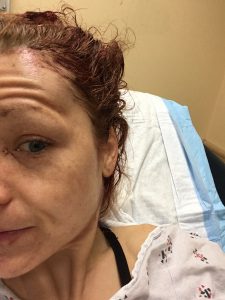
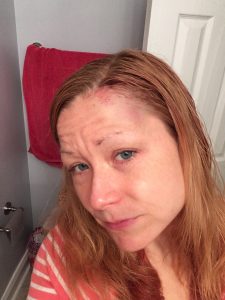
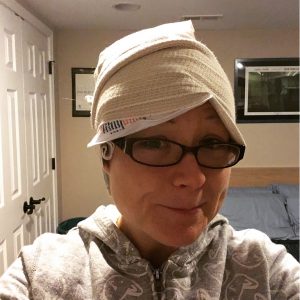
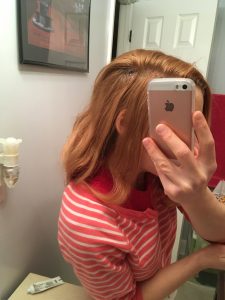
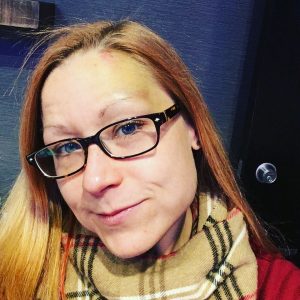
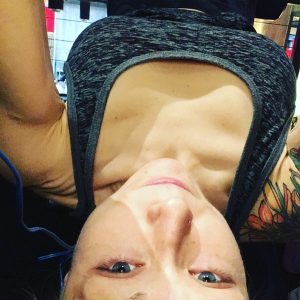
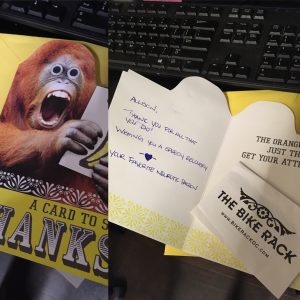
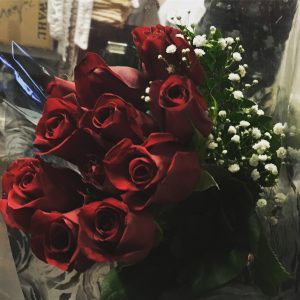
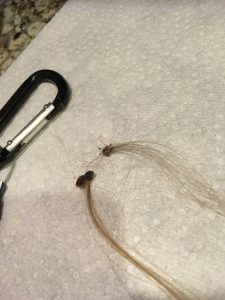

Leave a Reply